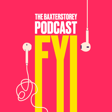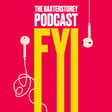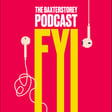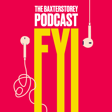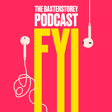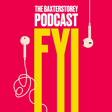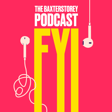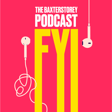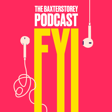Become a Creator today!Start creating today - Share your story with the world!
Start for free
00:00:00
00:00:01

S2:EP5: Creating an Inclusive Culture with Dan Stewart and Matt Webb.mp3
We're excited to host a very special episode on our FYI podcast that focuses on the importance of creating an LGBTQIA+ Inclusive Culture and how we can achieve this, not just during PRIDE Month but every day.
Our host Sean Marcs is joined by Dan Stewart, Resourcing Manager and Matt Webb, Accounts Director and Chair of the Game Leadership Inclusion and Diversity group for England Rugby.
Together, we delve into the profound impact of inclusivity, shedding light on how its absence can deeply affect individuals, and the pivotal role that leadership and advocacy play in building LGBTQIA+ safe spaces.
Tune in now and join the conversation.
International Gay Rugby:
#PRIDEMonth #Inclusivity #Diversity #LGBTQIA #Podcast #Community #Support #Equality
Transcript
00:00:05
Speaker
Hi friends, and happy Pride Month. Whenever you're listening to this episode on Spotify, because for us, Pride really is 365 days a year. Welcome to our Pride Month special Shine takeover episode on FYI, the backstory podcast. Shine is back to stories LGBTQIA plus an allies network, and we're on a mission to create the most inclusive culture in hospitality. And this conversation is part of our commitment to shine a light on community voices and experiences that create opportunities for learning both in and outside our business. I'm Sean Marks. I go by the pronouns he, they, and I'm your host for this episode, creating an LGBTQIA plus inclusive culture. And today I'm joined by two awesome humans, Daniel Stewart, resourcing manager and co-chair of our shine London hub and Matt Webb, who is not only an an awesome account director within backs of story, but is also a council member and chair of the game leadership inclusion and diversity group at England rugby.
00:01:02
Speaker
working to ensure that rugby becomes the most inclusive and welcoming of sports. Over the next 30 minutes, we'll be diving into their individual experiences and perspectives on creating inclusive cultures, together discussing why inclusion matters in workplaces, sports, and society at large, how we can build inclusive cultures, and the important role that leadership and advocacy play as part of that. Our wish is that this conversation will help ignite you to have further conversations and take actions towards greater inclusion wherever you are. First of all, a big thank you, Dan and Matt for joining. Good morning. Thank you for having us. Good morning. So I want to start this conversation, finding out a little bit about your story. So Dan, I'm going to start off with you first. You've been with Baxter Story for 22 and a half years now. Tell us a little bit about your career journey and what fuels your drive to create inclusion in the work that you do.
00:01:55
Speaker
Thanks, John. and To be able to answer that, we need to go back to 35 years ago when I first started in hospitality. um I lived in a godforsaken town in northeast of England, and it was about the time that I was 15 that I decided i I was trying to work out where I was going to have work experience. And at that point, there wasn't really anything that appealed to me. And what was left on the right at the bottom of the list was umal and catering and I decided to take that and instantly fell in love, instantly realized that's my people and that's my place to be. And so I worked around in a number of places and ended up running a bar in the center of this city. And i I loved it. I absolutely loved what I was doing. And over the 30 years that I progressed within the bar, um I ended up being the manager.
00:02:44
Speaker
and I managed the place at the Barna restaurant for seven years. And if you think about um a transient town full of university students, I met all sorts of walks of life. People that I interviewed came from overseas, came from all parts of the country, came from different backgrounds, and I met such a diverse and and interesting, fabulous group of people. And what I wanted to ensure I created What is the environment where they also felt comfortable to be themselves to be expected because i wanted to do um to just be the humans that i want to be able to realize that time and it was a joy to to see how that impacted the business.
00:03:26
Speaker
yeah i'm creating an inclusive and diverse workforce. We became the most popular bar, and that's no mean feat considering the place of bars on every corner. No, exactly. It worked incredibly well. um And I carried that with me. So when I moved to London, um I and started working for Houston and Church, which is obviously now back to the story. i was I was adamant that I was going to create the same environment around me and I hope that I did that as ah as a general manager and then as an operator operations manager, account director. I hope that I did that by be creating an inclusive and safe and and and prosperous work environment. But a few years ago, um after the COVID hit, um
00:04:15
Speaker
i was joy i take on the good I know the joy of Covid. But out of that, I mean, it was a horrible experience and I don't want to say any more now, it but it it was some things have come out of it that then changes the world. And this is something that I would key. I really wanted to be part of creating a much more inclusive culture. I realized that I've done that within my environment, I hope. But I didn't do it widespread. It wasn't as widespread as it could be. And whilst we are a really diverse workforce, considering the Europeans, the people that are trans people that have come in, and we were and didn't always see representation of everybody within the business. And when you then suddenly have a um ah the tragedy of Covid and the tragedy of Brexit,
00:05:02
Speaker
We're then looking to find our workforces suddenly. And we just don't have the transient people that we use to have anymore. So you look elsewhere. But while you're doing that, those creating an inclusive and safe environment and representational environment for people to be able out to hear, they would want to come and join us. And we're looking for people from all walks of life now to come and join and hospitality. You don't need experience. You just need of the right attitude. People are going to have the right to choose if they don't feel like they're working in a safe, inclusive, representational environment. 63% of job seekers would not go to a company they if they didn't feel that company had an inclusive vehicle.
00:05:44
Speaker
yeah Yeah, and and that's, ah you know, that's a scary statistic for that 63%. And, you know, particularly when you think for LGBTQ people, you know, 18% who are looking for work have been discriminated because of their identity while trying to find a job. So, ah no you know, they that that real important role that businesses play in ensuring that from the very beginning before persons even join, they are demonstrating their inclusive cultures, and they actually live and breathe them when that person joins also. Absolutely. That's kind of what we're doing in the strategizing. When you look at recruitment and you look at how we're going to be recruiting, you look at everything from the images that we use in our advert to the wording that we use, or where we position our advert to where we place our advert. So it's trying to drive through that. um
00:06:36
Speaker
It really is being able to see yourself or a representation of yourself or a version of yourself, or or at least some part of you represented somewhere within a company, then you have to go, okay, I feel like that's somewhere that I can give my best work. Yeah, no, absolutely. And um Matt, I'm going to come to you next because you know outside of backstory, You've been working really hard as a champion of LGBTQIA plus inclusion in sports, particularly rugby. Tell us a little bit about this part of your story and what led you to the work that you do today in England rugby.
00:07:08
Speaker
So what led me to the work of England Rugby, I guess, started back in my hospitality days and and and working in this industry. A young 20 something year old moved into London, the big smoke, had run some restaurants out in Surrey um and and sort of wanted to to see if I could actually make it and join the big hospitality sort of buzz that was London. I moved into London, was out to a selection of friends, but certainly not to a close family, or anybody linked with family at that time. I moved into London and sort of wanted to prove myself, and it was all about sort of that young,
00:07:42
Speaker
you know, manager trying to get his foot on the ladder and and and climb a career ladder. And and and and i I struggled immensely um with being comfortable with myself and being authentic at that point. I mean, it was, you know, what was it, the mid 2000s, it wasn't, you know, let long ago, but still felt that at that point, you know i didn't want to be defined by my sexuality i didn't want to be defined by who you know i loved i didn't want to know to i felt it could you know hold me back in my career i felt you know people may not make you know choose me for that promotion or choose me for that location if they felt i wasn't right because i wasn't that sort of person and i think it was really important that you know i look back on that with regret in the fact that i couldn't actually just be authentic and be myself
00:08:27
Speaker
yeah So that journey started and obviously I worked through my my sort issues with that and I kept going but ah you still had problems all the way up into my mid-30s and yeah wasn't really comfortable in a lot of ways. I certainly wasn't out to my family at that point. and move on Moving to Back to the Story which I'm sort of eight years in now and and it was more of a Monday to Friday world job which gave me some work-life balance which is lovely to have, having worked in restaurants and bars most of my life. and um needed a new social circle. Most of my friends had moved out of London to have get mortgages and have kids and you know move on with their lives, needed a new social circle, had always been a fan of rugby and played at school and enjoyed going on to Six Nations and watching and drinking beer and all that sort of stuff. But it was saying, well, I'll go down, i'll i'll have a yeah I'll have a little go, a little run around, have a beer, have a chat, maybe make some new friends.
00:09:20
Speaker
I'd absolutely fell back in love with it. I mean, they knew I'd played before, so they put me straight into the front row and made me play again, which was yeah a bit daunting at the time. But actually, but ah eight years in, it was where I found a home in Rugby. I mean, seeing the fact that I came from a place where I felt yeah very isolated, didn't really have a big friendship group in the gaming queer community. um And suddenly found, you know, this club that had over a hundred plus, you know, gay rugby players, all interested in the same thing as me. A lot of similar stories to me, ah who could be their authentic selves or out there living their lives. And I was just felt, this is what you can be. This is who you should be and why aren't you doing this? So it gave me an immense amount of confidence. um and And it was that confidence and it was rugby that then allowed me to sort of come out to my family, come out to, you know, those who hadn't come out to and actually start living properly authentically. But I think, you know,
00:10:10
Speaker
Moving that on, it's really important that, you know, I now help give that back to the other people, you know, team sports as well as work. You know, a lot of people find you their their home and their belonging in work, you know, but team sports specifically, you know, especially for the community where, you know, we've run away from team. I remember peace back in the day at school where, you know, you'd hide in the back and avoid it. i i was hiding And it's just like, how can I get out of this? Well, what asthma attack can I fake today? You know, it was, it was,
00:10:41
Speaker
it was you know It was awful by the time but but its but now and yeah know having that sense of community, having a team sport has really helped so many people and we hear stories within the the King's Cross dealers who I'm a sort of player and coach and former chair of now. is you know It's about those storie stories that people have moved to London, found a community, found a hobby, found sport, found you know ah yeah travel, you know found everything with it. and It's great. And we need to keep building on that. And Rugby should be like that no matter where you go. You shouldn't have to go to specifically to a club that's set up for the LGBTQ plus community. and We want anybody to be able to go to any Rugby club in the country and be able to feel belonging and included and welcome. When I was younger in Rugby, they used to talk about, oh, we don't care what you do in the sheets. It's you know what you do in the pitch that counts. I was like, well, I don't ask you to care what I do in the sheets. I don't want you to talk about what I'm doing in the sheets. But I also want to be able to bring my
00:11:30
Speaker
partner down and hold hands on the side of the pitch or give them a peck on the cheek in the bar without somebody giving you some glaring look. It's about that belonging, I guess, and that's the key word, I think, for both work and sport and society is about people should be able to feel that they belong. Yeah, belong and bring their full selves to wherever they are. And I love that both of you talked around the power that When teams are inclusive and diverse, they have on creating ah an incredible culture within the team, but equally the power that, you know, it gave you Matt to give you the confidence to step into who you are and be who you are in an authentic way, which is amazing.
00:12:06
Speaker
um And I love that both of you kind of plead into that word belonging, because for me, that word belonging is so important. and And that's really for me at the heart of inclusion. For anyone that knows me, I'm obsessed with Brené Brown. And I love that what she says about belonging in her book, Atlas of the Heart, she says that true belonging doesn't require us to change who we are. It requires us to be who we are. And it makes makes me think of experiences that people have, including myself, I speak about it quite a lot in how I assess how inclusive a culture is by asking those questions of how much can I be me? And if I can't be who I am, do I truly belong? And it's interesting not that you found that inclusion within rugby, because traditionally, and and I sit very much outside of sports and I ran away in PE. and I probably still run away from sports to this day. And part of that is some of my assumptions around some of those environments not being so inclusive.
00:12:57
Speaker
And so with that work that you're doing to create more belonging in rugby outside of the LGBTQ bus lead, um how are you approaching that? What are you doing to build a more inclusive culture? I think it's about education. I think it's about making people comfortable and you know rugby specifically is a very um monochromatic sport in the way that is run. yeah The leaders in rugby are all from a very specific sort of you know a demographic, effect not 100% but in general, the majority are. you know that' sort of
00:13:28
Speaker
you know, cis man, white, you know, middle-aged to elderly, have the time to volunteer, you know, and that's a really crucial piece is that volunteering is a really difficult thing to do and we record this in National Volunteers Week and I think it's important that, you know, we recognise those people do a lot of work but ultimately they also, you know, being sort of, society moves on and it's difficult for everyone to keep track and run on with society and and I think it's important that we give that there's an element of education there that so talks about you know what they can do and how they can help and make people feel included. mean The key message that we put out around rugby specifically, and this works as well in in business and recruitment, is that if you need more people, you need more players on the pitch, you need more volunteers running the bars and running their the clubhouses, then you need to make sure that you're an environment and a club that people want to be involved in and and want to go to.
00:14:19
Speaker
which means you need to feel like you're inclusive. And that's not just for the LGBTQ plus community, it's for those from the ethnic diverse backgrounds, you know, with different religious backgrounds, those, you know, we have, you know, so socioeconomic problems and, you know, and have come from a very different background there and feel like rugby is the game for posh people and can't play it. You know, how are you yeah going out there and showing that as a club, everybody is welcome and everybody is is free to be themselves. And I think that's really key. The the things we do, the tickets we do, and the clubs are the most successful, the ones that will have a pride theme weekend, you know, and you're seeing that now in sort of like professional sports premiership rugby, the Harlequins, who I'm a fan of, but Harlequins pride mug.
00:14:59
Speaker
they run a they're the only sort of premonition rugby club who's run a pride week and sort of sort of themed you know not themed but sounds like it' a party it's not but donenna but done a sort of you know event where they celebrate their lgbtq plus fans and players as well and i think you know the visibility is the key point showing showing that those people are there showing people are welcome and and that's really really key there's some structured pieces as well one of the things i really believe in is being an active ally and also and doing a lot of stuff around that so We run and I've been part of yeah developing a program called the active bystander training, which is used in two different ways within England rugby says one it's used as a proactive tool to teach people how to be.
00:15:41
Speaker
uh you know active in sort of supporting you know minority groups and you know if they are standing at the side of the pitch and they hear somebody say something that's not appropriate how to deal with that how to you know bring them out use use you know different ways of sort of you know confronting you know and i say confronting not in an aggressive way there are different ways you can either be quite a direct confrontor and say that's not on or you have to sort of you know delegate it away to somebody else or you have to sort of just you know change the topic then come back to it at later times as ways of doing it that you know are important and we'd rather training rugby clubs and fans and leaders of rugby clubs how they can do that.
00:16:19
Speaker
but it's also used in a sort of, not a punitive, but as an educational tool as part of the discipline process. Rugby is very much about discipline, you still call the referee sir, there's no arguing back to the referee um and you go in there and you sort of say well if there are issues and it's yeah one that you can't identify an individual as being specifically doing then you can sit the whole team down and put them through this training to make them understand the impact of what sort of the some of the language that they're using says and and the Steelers have had to report teams to the RFU for homophobic abuse and on the pitch and they've had to sit through this training in order to be able to continue their league. So I guess summarising it, is it's it's training, it's education, it's sharing what's continuously changing and what's new and how people can be more inclusive, how people can so support. It's also then using ah examples of visibility, showing best case, best practice,
00:17:10
Speaker
And I guess after that, then it's also using and having tools at your hand to how you deal with, you know, issues and scenarios that come up. But I think all of that and sport equally measures through into into business too. Yeah. Yeah. and And I think, you know, that's so important. What you're saying there also is not, not just about the education, the training and and the visibility of, you know, representing themed days and sort of such, it's actually the action of when something happens that maybe takes away from somebody feeling safe in that environment that something's actually done and there's a real process and ah intention behind ensuring that everyone feels and safe feels safe and so that inclusivity is kind of maintained um because but you know often people think about we build inclusivity and then we don't think about it again actually it's something that requires constant maintenance and constant conversation and I know Dan and you know earlier on in our conversation you talked about the need for safe spaces and creating those safe spaces
00:18:05
Speaker
And it's interesting when you look at some of the data from Stonewall, there's still a high percentage of LGBT plus employees, 25% of LGBT plus employees, 26% of trans people, 37% of non-binary people who still aren't out at work for that fear of discrimination because they don't have that safe space. So Dan, I'm curious from your experience, what do we need to do to build and increase the size of safe spaces in businesses? creating the narrative, I think, um of of what the narrative has been in the past, um ah picking up on what Matt said about visibility. I pretty much spent most of my youth, until I moved to London to be fair, which was 20 years ago, um feeling invisible, never visible. I was invisible, but I put myself in an invisible place because it was the safest place to be. Not only was I proud,
00:19:00
Speaker
um I was also of ambiguous sexuality and that two things that you're kind of going in ah in a town that doesn't, see I didn't see any other representation of that. I didn't see any other reflection of it and I didn't have any um that are people to to to be around. I think what's really important is ah ensuring that we have representation within the business and it's seen and it's visible. yeah um Representation, if it's there, we consider more. We consider more perspectives. we When we're creating um strategies for the business or how we're moving the business forward or how we're creating um the the environment that we want to be able to create, we want to draw in the right talent.
00:19:45
Speaker
And there's hugely talented people out there who are maybe passinging passing it by because they don't see anything that represents them within within the industry. So creating those sort of safe spaces to be able to be who you are takes everybody's effort to be involved in it. It's not just going to be a few people that are going to try and pioneer this. It's just not going to be everyone that gets on board. um and and creates that environment in their like in in the um locations that we have, in the support functions that we have, it needs to be visible everywhere. So to do that, um that has to be the imagery that we use, the wording that we use in adverts, the wording that we use in any any kind of advertising that we do,
00:20:31
Speaker
all the images, the videos, everything that we do, needs to you need to feel like you can see yourself there. Or if you don't see yourself there, you feel that its you can be yourself there. Yeah, yeah. Matt, did you have something to add to that? Yeah, I'd add into that as well. I think it's a responsibility of leaders and the leaders of the business too to ask questions. and not make assumptions and as this i so of said before and i think a lot of people in the community in the lgbtq plus community will say you don't come out once you have to come out dozens and dozens and dozens of times yeah so every time you change company every time you change location every time you employ a new team member or get a new boss
00:21:15
Speaker
you have to go through that process. That's something that you know yeah people in general don't sort of think about or have to do. as well so Making the assumptions that some some leaders may make about people, you know going up to them at sort of a coffee morning and saying, oh you know how's your wife, how's your partner, you know yeah think about the wording you use, think about how that's created. and But it's it's about asking questions specifically and what's going to help and support and make somebody feel comfortable. Use Shine as ah as a platform to speak to and ask about that if you want to learn more. But also, just in general, if you have people in the community, I'd rather somebody ask me questions about, you know, me rather than just sort of making an assumption. You know, it's a silly thing. and It was a nice thing that somebody tried to do is I got a Christmas card one year from Back to the Story a few years back. um And it was to to Matt and Robert, you know, Merry Christmas, thank you for your hard work, blah, blah, blah.
00:22:05
Speaker
And it turns out somebody made an assumption and they thought they knew me. They didn't really know me. They hadn't asked the question and they put my dad's down. It was my partner and my Christmas card because my dad was my dad was my single. I'm single. You know, between rugby and work, I don't have time for a sort of ah love life, apparently. But and it was very much, you know, somebody made the assumption that, oh, but well, we have Matt's, Matt's, Matt's K. So, oh, well ah some Robert Webber must be asked questions because that sort of thing. whilst It was nice that somebody had tried. it also was a bit, well, if somebody just asked me, you know, and they yeah knew me better, you know, then that wouldn't be such an issue. And I think, you know, that's that's that that piece, that assumptions that people make, because you go in there and you use language that, you know, assumes a so certain point of view, you know, you ask language, you ask questions that assumes a certain perspective, a certain lived experience. And if people do that, then it you then you
00:22:57
Speaker
You always have to go through that sort of coming out piece again, but also just that sort of internalized bit of shame still. I mean, I think it, you know, it's no matter how comfortable and out you are and and how much you talk about. I mean, I've been on national television talking about being out and being gay and being rugby, you know, but yet still, you know, somebody says, oh, uh, do you have a girlfriend? And I suddenly go, oh, and then you suddenly sort of go, why am I, so why am I struggling with this question still? And it just becomes a bit daft. So I think, Leadership is really key and I think the leaders of the business are responsible for creating the same space by leading the right example, by using, you know, not assuming anything, asking questions and and using language that isn't going to put people in a position where they feel they're suddenly under pressure to have to go through each another variation of it coming out. Yeah. I also think it's important to know just to add on to that bit as well is that you don't have to come out, you just need to be yourself.
00:23:51
Speaker
Very important to say you you can be part of a community, but you don't have to have to put your stamp on it or tell everybody what you're all about. It's just being able to feel safe and inclusive in an environment where you can be yourself. That's the most important thing for me. Yeah, because also there's there's also that part of um you know even even if you don't identify ah you know as LGBTQI+, there's still gender expression. And I think that's more and more people you see in the wider world are expressing themselves through their clothing and and through the way that they choose to style themselves in ways that people would stereotypically kind of class or kind of assume as a background for somebody. And I love that. That's been challenged a bit now. And I'd love to see more of that in spaces where people challenge the status quo on you know what we should shouldn't be wearing and expressing ourselves. Matt, go back to
00:24:41
Speaker
and years ago or eight years ago when you joined. There's no way we could wear ties and suits and jackets and this kind of thing. And look at how it is now. Culture can change. You embrace it and you have to be all be part of that change and want to change it as well. So we can do it with ties. We can do it with it. Yeah and then the progress has been fantastic but we also have to remember I mean I know this is where I have a little bit of yeah Dan and I both circulate in the London bubble and yeah and and this podcast will be heard by people who are who work tend to work in some pretty blue-collar sort of factories and sort of some very specific sort of areas in different parts of the country which are not as you know ah so socially, not socially forward, not being derogatory, but don't have those visibility, don't see people and don't you know see, have the visibility of you know queer people as much in their society. So therefore, you know somebody who wanted to use a sort of gender in neutral uniforms or present in a completely different way, you know it's is are they going to be safe in that area? So what is Baxasori doing with its clients, with its know customers, with its you know It's sort of information to support that person, so make sure that that if they experience anything at work through a client base as well, that's that's obviously followed up and dealt with. But London and leads the way is the thing, and that sounds very London-centric, and there'll be people rolling their eyes at that, I'm sure. But unfortunately, that's the case there is. But we need to make sure that, you know especially this is why we set up shine to have regional you chairs and regional hubs,
00:26:13
Speaker
so that we can make sure that each area has some representation and can keep growing and can be looking at what it means to be, you know, a queer individual in a different part of the world. You know, our chair up in Aberdeen in Scotland, you know, yeah what does it mean what does it mean for them up there to be able to sort of, you know, be themselves and to bring the Scottish people along with them. So, you know, there's a lot of work that's done really well, but we have to make sure we keep on with it. Yeah, no, I think you're right. I mean, there is definitely more visible representation in specific so cities scattered across the UK. um And I suppose that the one thing that ah I imagine really helps with that is the role that ESGs and inclusion groups play and, you know, particularly shine within Back to the Story and dive in and rise. and You know, I'd like to know from you a little bit more about the role you feel ESGs and inclusion groups do play in creating
00:27:03
Speaker
more tangible resource for leaders in areas where they don't have as much resource as we do in London. yeah c yes excuse to me i mean I'll take a quick rugby example going back to that and I work with England Rugby, their staff have their Proud Roses which is their LGBTQ plus inclusion group and but they've had a really tough time over the last few years. you know England Rugby brought in a uhm gender participation policy which means that transgender women can no longer play contact rugby um and that sort of has followed on from a number of pieces has happened through sort of sport in general we've seen a lot of it on the press we've seen a lot of it in terms of some of the culture wars that have been stirred up we've seen a lot of it in terms of the areas and work that we're you know that sports doing but
00:27:49
Speaker
That group has had to work really hard to sort of identify their space and to work on how they are can still influence the the sport and influence there's their bosses who are the leaders of the RFU to then be able to sort of make sure that they still stand up and say, OK, well, whilst we are very aware of this ah specific policy, you know, we still have to make sure that we are in the room and we're talking and we're looking at how that can be worked with, reversed, changed over time, but also make sure the rest of the community is still represented in the decision making that goes on. And that's going to be the same in in sort of in terms of Back to the Story, we saw it with Rise having a real impact on the new benefits package that came through, but the ah Shine is going to move into that stage now where it needs to be consulted and and worked with and worked and support changes that come to sort of working conditions, changes that come to you know sort of you know the sort of general policies, the language that's used within documents and you know campaigns and items that Back to the Story does.
00:28:44
Speaker
And that's what an ESG can really do. But again, it's also a roundtable. Hopefully we'll have some social side to it and allow people to say have a sense of belonging, you know, and especially regionally where we set up these little these hubs and we get people to grow in those hubs locally. OK, are we ready for a quick lightning round? In one word, an LGBTQI passing culture, inclusive culture is? Safe. Future. One tip you have for leaders to sustain an inclusive culture right now. Question. Ask questions. Yeah. How will you be celebrating Pride Month? Ooh. Champagne. What are you doing? What are you doing? Can I come play with you? Can we go out? We can go do something, I'm just sure. Champagne. Excellent. There you go. Champagne. Oh, nice. Okay, I'm there too.
00:29:36
Speaker
And I said this one last one question, you know, we're all aware and we talked a little bit about it in the UK, but in the wider world, there are real challenges that are impacting our community and the rights of people to live their authentic selves. And for some people, this can feel like a really dark time. um I want you to let people know what keeps your torture light for a brighter and more inclusive future. Creating. My world, I love creating an environment or having an impact on an environment and everything you can do to be able to do that and watching people prosper and grow in it is a joy. and So my charge, my need on it is to ensure we get a really diverse workforce um and representational.
00:30:20
Speaker
the perspective that you're going to get, the perspective that we probably haven't considered because we don't have those voices there and the more voices that we have the more we can change and the more we can then create a a business and prosper from it as well. It's now really known that businesses prosper financially, they they open their markets up to different markets. There's so many different things that can benefit from all of it, but we can't see it yet because we're not there. But we're starting to get towards it and you're starting to feel it. So that's the excitement for me now is the feels like traction happening, feels like things are moving in the right direction. It's but it's things you've scratched your head about for years and gone, is this actually ever going to change? And it is in our lifetime. So incredibly powerful that it's moving in the right direction. So that that's that's Michael.
00:31:07
Speaker
I think keeping the spark alive for me, I think it's a constant process of renewal. It can be for those those who sort of put their head above the parapet and want to to campaign and and ask for things, it can be exhausting. You know, a lot of us do this as a we're recording this and during our daytime, but ultimately this is extra to our to our day job. So, you know, it can be absolutely exhausting and we have to make sure we look after those who do put their head above the parapet. But, you know, I get every so often I get another first of renewal. and And I had this last week, when I was in Rome for the Gay Rugby World Cup, the Bingham Cup, with my team, the Kings Cross Dealers were there. And one of the sort of key pieces of the for finals day was a international barbarians transgender player game. And they they had two teams, in fact, they have three teams in terms of numbers of transgender players from around the world who came together to play a 40 minute barbarians game.
00:32:02
Speaker
um And, you know, for some ah transgender women who can't play in England anymore or Scotland or Wales or Ireland or other countries, they got to play rugby again, which they've not been allowed to do for a couple of years. And they were mixed in with sort of a player of mine who's a transgender male who plays on my team who is 19 and was the best player in the pitch. And it's just phenomenal. And he was just, he scored a try and converted and I had a real proud dad moment there where I was crying inside the pitch. you know, wanting, wanting, you know, the success to happen. But that's renewed me again, because ultimately, I've still stood there and watched this and everybody worries about sort of the the the gender piece and transgender penny pool and sport. And should watch that game and see that nobody, nobody was injured, nobody got hurt, nobody died, you know, everyone has played rugby, had fun, enjoyed themselves.
00:32:49
Speaker
and the joy that was expressed and then also the support from the community for them afterwards was was just a beautiful thing to see um and there's a link to the games if people want to watch it. I can get it shared so people can watch those games from the World Cup and it was was just a wonderful thing but i think I think you have to find ways to keep renewing yourself and we all have to keep finding ways to because it can be become a struggle and I sit in some of the old council chambers at the RFU and wonder why I'm still there doing it and what um what impact am I having And I think we all need to make sure we look after those who support each other and and and lift each other up as well, but yeah so the spark has is constantly has to be renewed to answer your question so find the things that renew it do things that are going to renew it um and support those who are stepping forward because.
00:33:35
Speaker
you can feel very lonely and and and isolated sometimes so we have to make sure that we are shining a light to use a to use some sort of cliche pun on the people that do do the work so that they get um renewed regularly. Wow, what a conversation. I definitely feel renewed. So thank you for both Dan and Matt for being part of the first ever Shine Takeover episode on FYI, the Backstory Podcast for Pride Month. And for those listening, we hope you found valuable insights from hearing these unique perspectives and are taking away some actions to consider in both creating and fostering and keeping alive a more LGBTQI-plus inclusive culture. If you enjoyed today's discussion, don't forget to subscribe to our Spotify channel for more engaging conversations and stay tuned for upcoming episodes. Keep shining.
